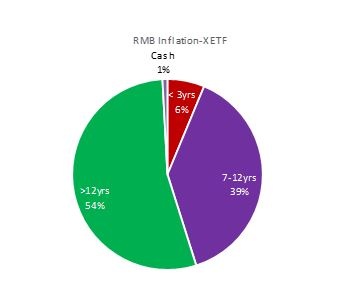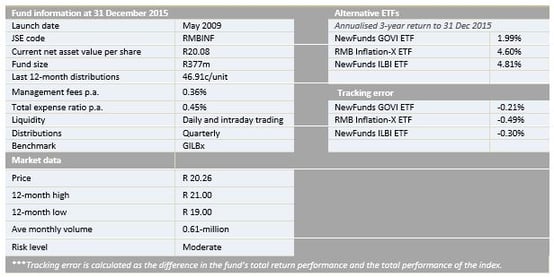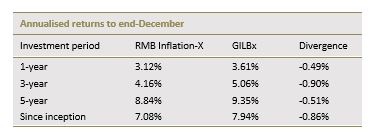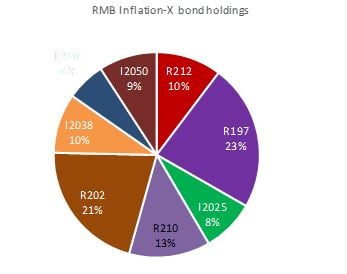Suitability: This fund invests in government-issued bonds that pay interest linked to inflation. Out of the three ETFs that provide exposure to local bonds, RMB Inflation-X is the only fund that pays dividends to unit holders. The other two alternatives – New Funds Govi and NewFunds ILBI – are total return funds, meaning they automatically reinvest the coupons. RMB Inflation-X therefore suits investors who require consistent income that is protected in real terms.
What it does: The RMB Inflation-X ETF aims to track the performance of the government inflation-linked bond index (GILBx). GILBx is a weighted basket of South African government inflation-linked bonds.
Advantages: The main attraction of bonds as an asset class is their low correlation with stocks. Over the past decade, the JSE’s all bond index has had a lowly correlation factor of 0.13 with the all share index. Because the ETF is inflation protected, the initial amount invested will increase in line with inflation while real distributions are paid out.
Disadvantages: The fund is designed to replicate the performance of the GiLBx and does not make active bets relative to sectors, duration or credit quality. It is also restricted to certain government bonds, thus excluding corporate bonds and other issues by state-owned institutions such as Eskom and Sanral.
Top holdings: The fund is invested in bonds issued by the SA government with the majority being long-term bonds with maturities of seven years or more.

Risk: The most common risks associated with fixed-income securities are inflation risk, credit risk and interest rate risk. However, because all of this ETF’s constituents are inflation-linked sovereign bonds issued by the SA government, they do not have inflation risk and credit risk is minimal. Interest rate risk arises from fluctuating interest rates. As interest rates rise, bond prices fall and vice versa. The GILBx index currently has a high modified duration of 12.3 years, so its interest rate sensitivity might be considered to be fairly high. That means the value of the ETF will fall 12.3% for every one percentage point increase in interest rates.

Fees
RMB Inflation-X ETF has a total expense ratio (TER) of 0.45% which is within range of the average of the JSE’s ETF market.
Historical performance
Since its establishment in 2009, the fund has recorded annualised return of 7.08% while consumer inflation grew at an average of about 4.4%.

Fundamental view
Government bonds are traditionally seen as safe havens in turbulent times. This is largely because they are less volatile than stocks and often their prices trend in the opposite direction to equities so they offer good diversification. The past decade has been a superb one to own bonds. The IGOV, made up of government inflation-linked bonds, returned 10.1%. While these are lower than the 14% returned by the JSE top 40 total return index, the volatility of bonds of 6% is just a fraction of the 19% for the top 40 index.
Two key factors supported the performance of bonds during the period have been declining interest and inflation rates. The South African Reserve Bank cut the repo rate from 12% in 2008 to a low of 5% reached last year. Inflation retreated from around 12% to below 3%. Now, with interest rates still near historic lows, bond prices are still relatively high. As interest rates continue rising bond prices will almost certainly decline. Expectations of a higher inflation rate might, however, make inflation-linked bonds more valuable.

Alternatives
Retail investors seeking exposure to bonds have two other options: NewFunds ILBI and NewFunds Govi both issued by Absa.
NewFunds ILBI ETF tracks the Barclays Capital/Absa Capital South African government inflation-linked bond total return index of eight RSA inflation-linked bonds. All coupons received are automatically reinvested to provide a total return product. Inflation-linked bonds have an interest rate (coupon) calculated as a function of the inflation rate. The product has an expected TER of 0,28% a year.
NewFunds Govi ETF is also a total return product but tracks the performance of the SA government bond total return index (Govi). This index consists of bonds issued by the South African government, including only those issues in which National Treasury obliges the primary dealers to make a market. The TER of 0,24% a year makes it the cheapest in the category.
Disclaimer
This research report was issued by Intellidex (Pty) Ltd. Intellidex aims to deliver impartial and objective assessments of securities, companies or other subjects. This document is issued for information purposes only and is not an offer to purchase or sell investments or related financial instruments. Individuals should undertake their own analysis and/or seek professional advice based on their specific needs before purchasing or selling investments. The information contained in this report is based on sources that Intellidex believes to be reliable, but Intellidex makes no representations or warranties regarding the completeness, accuracy or reliability of any information, facts, estimates, forecasts or opinions contained in this document. The information, opinions, estimates, assumptions, target prices and forecasts could change at any time without prior notice. Intellidex is under no obligation to inform any recipient of this document of any such changes. Intellidex, its directors, officers, staff, agents or associates shall have no liability for any loss or damage of any nature arising from the use of this document.
Remuneration
The opinions or recommendations contained in this report represent the true views of the analyst(s) responsible for preparing the report. The analyst’s remuneration is not affected by the opinions or recommendations contained in this report, although his/her remuneration may be affected by the overall quality of their research, feedback from clients and the financial performance of Intellidex (Pty) Ltd.
Intellidex staff may hold positions in financial instruments or derivatives thereof which are discussed in this document. Trades by staff are subject to Intellidex’s code of conduct which can be obtained by emailing mail@intellidex.coza.
Intellidex may also have, or be seeking to have, a consulting or other professional relationship with the companies mentioned in this report.